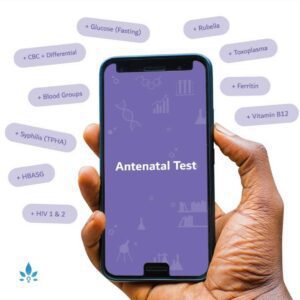What Happens at Prenatal Visits?


Prenatal visits are important for many reasons: to make sure your baby is growing normally, to screen for any concerning symptoms, and to provide education about your pregnancy, delivery, and the postpartum period. There is a lot to cover during each visit, and it is important to make sure you get your questions answered.
Your first visit will likely be your longest. Try using our at-home antenatal test and for better understanding try the 4 week prenatal course and buy the mother and baby pack at Nabta shop.
At this appointment, you will have a detailed history taken. This will also include screening for any pertinent family history, so try to think of this ahead of time. You will also have a physical exam done, and this typically includes a pelvic and breast exam. After this visit, you will probably be sent to a lab to get your prenatal blood tests done. This is a lengthy visit with a lot of information given out, be sure to take it home and read it thoroughly.
Your due date will be calculated at your first visit using a combination of your last menstrual period and/or an ultrasound (if done yet). Keep in mind that if you haven’t had an ultrasound by this point, your due date may change once it is done.
Regarding ultrasounds, the most common question many women have is, “When is my first ultrasound?” This may be done at your first visit, but not all doctors have ultrasound machines in their office. You may be sent for one then, or you may not have it scheduled for a few weeks, depending on how far along you are.
At all visits, your blood pressure and weight are checked. This is to monitor for high blood pressure and to make sure you are gaining the right amount of weight. This is important to your baby’s health, so don’t be alarmed if it is discussed frequently. Your urine will also be checked to make sure your kidneys are functioning properly.
Your belly will be measured to make sure your baby is growing well, and your baby’s heart rate will be listened to at each visit after it can be heard, usually around 12 weeks. This is usually everyone’s favorite part of the visit!
Your appointments are usually monthly in the beginning, and by the time you are term they are once a week. Of course, if there are any high-risk issues, you may need to see your doctor more frequently than that.
Lastly, every visit is a chance to ask your obstetric provider questions. Writing them down beforehand can be helpful. Along the way, you should gain information about nutrition, your body’s changes, labour and delivery, and breastfeeding and postpartum care. Be sure to speak up if something isn’t making sense, your doctor needs to know how to help you best.
Reviewed by Dr. Jen Lincoln, November 2018
Sources:
- The American Congress of Obstetricians/Gynecologists
- Your Pregnancy and Birth
- 4th ed.
Powered by Bundoo®













































